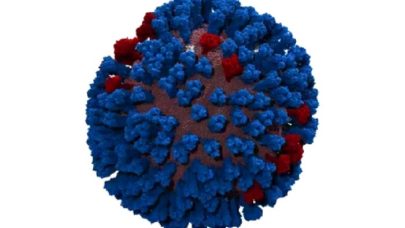
New ASF Roundtable to Spotlight HPC’s Role in Fighting COVID-19
February 16, 2021
With the one-year mark of the pandemic in the U.S. rapidly approaching and vaccinations ramping up, decision-makers and stakeholders are beginning to look back Read more…

What’s New in Computing vs. COVID-19: Fugaku, Congress, De Novo Design & More
July 2, 2020
Supercomputing, big data and artificial intelligence are crucial tools in the fight against the coronavirus pandemic. Around the world, researchers, corporation Read more…

Researchers Use Comet to Examine a DNA-Editing Enzyme
March 14, 2020
Genome editing stands to change the trajectory of human civilization, with massive implications for treatments of any genetic disease and potential for even bro Read more…

Blue Waters Supercomputer Helps Tackle Pandemic Flu Simulations
February 26, 2020
While not the novel coronavirus that is now sweeping across the world, the 2009 H1N1 flu pandemic (pH1N1) infected up to 21 percent of the global population and Read more…

UCSD, AIST Forge Tighter Alliance with AI-Focused MOU
January 18, 2018
The rich history of collaboration between UC San Diego and AIST in Japan is getting richer. The organizations entered into a five-year memorandum of understandi Read more…

‘Sherlock’ Applies Problem Solving to Complex Challenges
August 21, 2013
San Diego Supercomputer Center (SDSC) is announcing a bold new cloud and analytics-based initiative, called Sherlock. Established by SDSC with the assistance of SD Technology and Chickasaw Nation Industries, the Sherlock-branded project represents an "extensive portfolio of information technology services for healthcare and government." Read more…

- Click Here for More Headlines

Whitepaper
Transforming Industrial and Automotive Manufacturing
In this era, expansion in digital infrastructure capacity is inevitable. Parallel to this, climate change consciousness is also rising, making sustainability a mandatory part of the organization’s functioning. As computing workloads such as AI and HPC continue to surge, so does the energy consumption, posing environmental woes. IT departments within organizations have a crucial role in combating this challenge. They can significantly drive sustainable practices by influencing newer technologies and process adoption that aid in mitigating the effects of climate change.
While buying more sustainable IT solutions is an option, partnering with IT solutions providers, such and Lenovo and Intel, who are committed to sustainability and aiding customers in executing sustainability strategies is likely to be more impactful.
Learn how Lenovo and Intel, through their partnership, are strongly positioned to address this need with their innovations driving energy efficiency and environmental stewardship.
Download Now
Sponsored by Lenovo
Whitepaper
How Direct Liquid Cooling Improves Data Center Energy Efficiency
Data centers are experiencing increasing power consumption, space constraints and cooling demands due to the unprecedented computing power required by today’s chips and servers. HVAC cooling systems consume approximately 40% of a data center’s electricity. These systems traditionally use air conditioning, air handling and fans to cool the data center facility and IT equipment, ultimately resulting in high energy consumption and high carbon emissions. Data centers are moving to direct liquid cooled (DLC) systems to improve cooling efficiency thus lowering their PUE, operating expenses (OPEX) and carbon footprint.
This paper describes how CoolIT Systems (CoolIT) meets the need for improved energy efficiency in data centers and includes case studies that show how CoolIT’s DLC solutions improve energy efficiency, increase rack density, lower OPEX, and enable sustainability programs. CoolIT is the global market and innovation leader in scalable DLC solutions for the world’s most demanding computing environments. CoolIT’s end-to-end solutions meet the rising demand in cooling and the rising demand for energy efficiency.
Download Now
Sponsored by CoolIT
Advanced Scale Career Development & Workforce Enhancement Center
Featured Advanced Scale Jobs:
HPCwire Resource Library
HPCwire Product Showcase
© 2024 HPCwire. All Rights Reserved. A Tabor Communications Publication
HPCwire is a registered trademark of Tabor Communications, Inc. Use of this site is governed by our Terms of Use and Privacy Policy.
Reproduction in whole or in part in any form or medium without express written permission of Tabor Communications, Inc. is prohibited.
























